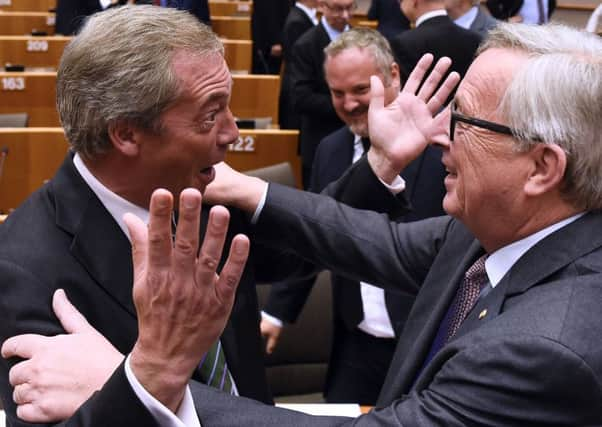Nigel Farage's vaudeville act sets wrong tone


Nigel Farage’s performance at the European Parliament was an unedifying spectacle as he gloated over the Brexit victory and harangued MEPs, adding insult to injury by saying “most of you have never done a proper job in your lives”.
The Ukip leader’s hectoring tone and very emotive and provocative language were uncomfortable and unsettling to witness.
Advertisement
Hide AdAdvertisement
Hide AdAny outsider watching Mr Farage speaking in the emergency Brexit meeting, and his views were seen and heard by millions of people across Europe and picked up by television networks worldwide, would assume he was representing Britain. But he does not and should not be portrayed as such.
Looking at the wider picture, away from the “sideshow” Mr Farage took to Brussels, it was saddening to see the high emotion generated and how bitter many of those present in the European parliament felt as they witnessed the disintegration of the unity they had worked so hard to be part of, a unity that stood for over four decades.
On top of that, nearly a week after the referendum which at times reached fever pitch, we are now facing the sobering experience of getting an inkling of what Britain might face negotiating an exit from the EU. Any thoughts that the European Union might be prepared to look favourably on the UK during exit negotiations have been firmly quashed.
The luxury of having plenty of time to unpick arrangements is going to come under severe pressure. The clear view in Europe is that an entire continent cannot be held up from going about its daily business so that the British Tory party can heal itself. The longer that hold up continues then it is reasonable to assume the harder Europe’s stance in negotiations will become.
Angela Merkel, who was initially visibly shocked at the referendum result, has now hardened her stance. In a hard-hitting speech to the Bundestag, the German chancellor made it clear that Britain will not be allowed to cherry pick the parts of the European model it wants and simply do away with the bits that it doesn’t.
That is probably a signal that if Britain wants to continue with a trade deal then there will be a cost to pay, either in straight cash or on concessions on the free movement of labour.
Mr Farage’s bombardment also sadly again highlighted the gulf that has grown between Scotland and England on Europe.
Today First Minister Nicola Sturgeon arrives in Brussels for talks with European Parliament president Martin Shultz and will search for ways of maintaining Scotland’s relationship with the EU, although exactly what that would be and how that would work has yet to be made clear. But perhaps given the atmosphere in the European parliament yesterday her approach might be looked on with favour.
Advertisement
Hide AdAdvertisement
Hide AdMs Sturgeon has been the politician who has demonstrated the strongest and clearest leadership in this debacle, and her approach to seeking out opportunities in the way that she is doing must be commended.
Victims being let down again
When an expert member of the Scottish Child Abuse Inquiry resigns citing Scottish Government interference threatening its independence, alarm bells should start to ring.
The inquiry is being held so that the victims, who had the courage to come forward, can get some sort of closure and that the people and institutions responsible for the failings are brought to justice and to ensure where possible the same mistakes are not made again.
A childhood which has been blighted by abuse can never be regained.
But when an official inquiry tasked with examining what went badly wrong across a range of institutions was established there was great hope that the investigation would resolve some difficult and dark chapters in Scotland’s recent past. But Professor Michael Lamb’s departure detracts from that hope of closure for the survivors.
We should listen to what he says because there is a distinct possibility that a golden opportunity to try to rectify some great wrongs will be squandered.
At a time when the investigation should be honing in on the procedures and practices which formed a protective net around abusers, we are instead being forced to contemplate government interference in an inquiry that might in the end be pointing to government failings. Any suggestion that there has been micro-management is sure to raise doubt about any conclusions it inevitably comes to.
If this process is not perceived as robust then it is simply a waste of time and money and will be a further blow to the victims and a further example of them being let down by the state.